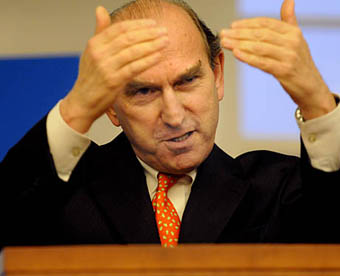CounterPunch, February 9, 2005
.
CounterPunch magazine ran an extensive article on one of the leading neoconservatives, Elliot Abrams. The article shows clearly the thoroughly Jewish roots and currents that make the neocon movement nothing more than a Jewish supremacist apparatus. One of the more revealing quotes shows that Abrams had even written a paper on how American secularism is a threat to Jewish identity. Yes, Jewish identity is paramount, and Jewish success and power is dependent on destroying the “identity” of those who might oppose the Jewish identity and agenda. Abrams and all the Jewish neocons operate under the guiding principle that the more fractured and multicultural a society is the more amenable it is to Jewish ultra-ethnicism. One fascinating area is how many of the Liberals who opposed the war are now in lockstep with the Neocons. But, then when you examine the ethnic identity of those liberals you find again the one linking, powerful factor in the world’s political dynamics: Jewish supremacism. Even if support of Israel’s ultra-racist agenda is a violation of every liberal taboo, so be it, for it is not about liberalism or conservatism at all, it is simply about Jewish supremacism. –DD
“Elliott Abrams embodies neoconservatism. Perhaps more than any other neoconservative, Abrams has integrated the various influences that have shaped today’s neoconservative agenda. A creature of the neoconservative incubator, Abrams is a political intellectual and operative who has advanced the neoconservative agenda with chutzpah and considerable success.
As a government official, Abrams organized front groups to provide private and clandestine official support for the Nicaraguan Contras; served as the president of an ethics institute despite his own record of lying to Congress and managing illegal operations; rose to high positions in the National Security Council to oversee U.S. foreign policy in regions where he had no professional experience, only ideological positions; proved himself as a political intellectual in books and essays that explore the interface between orthodox Judaism, American culture, and political philosophy; and demonstrated his considerable talents in public diplomacy as a political art in the use of misinformation and propaganda to ensure public and policy support for foreign relations agendas that would otherwise be soundly rejected.
Abrams has moved back and forth between government and the right’s web of think tanks and policy institutes, holding positions as a senior fellow at the Hudson Institute, president of the Ethics and Public Policy Center (EPPC), advisory council member of the American Jewish Committee, and charter member of the Project for the New American Century (PNAC). Abrams has maintained close ties with the Social Democrats/USA, the network of right-wing social democrats and former Trotskyites who became the most vocal of the self-described “democratic globalists” within the neocon camp in the 1990s.
His family ties have helped propel Abrams into the center of neoconservatism’s inner circles over the past few decades. In 1980 he joined one of the two reigning families of neoconservatism through his marriage to Rachel Decter, one of Midge Decter’s two daughters from her first marriage. As a member of the Podhoretz-Decter clan, Abrams became a frequent contributor to Commentary and Norman Podhoretz’s choice to direct the magazine’s symposiums on foreign policy. As one of the leading neocons in the Reagan administration, Abrams also served as a liaison between government and the right wing’s network, as exemplified by his appearances at the forums organized by Midge Decter’s Committee for the Free World in the 1980s.
… As an aide to Sen. Henry “Scoop” Jackson in the 1970s, Abrams began his political career mixing the soft and hard sides of the neoconservative agendaas both a proponent of Jackson’s strategically driven human rights policies and as an advocate of his proposals to boost the military-industrial complex. Through Jackson, Abrams became involved in a group of Cold Warriors called the Coalition for a Democratic Majority, which was associated with the Democratic Party and led by the neoconservatives. Among former members of Jackson’s staff to find positions in the Reagan administration’s foreign policy team were such neoconservative operatives as Paul Wolfowitz, Richard Perle, Frank Gaffney, Charles Horner, and Ben Wattenberg. Other Jackson Democrats who secured appointments in the Reagan administration included Jeane Kirkpatrick, as UN ambassador, and neoconservatives on her staff, such as Joshua Muravchik, Steven Munson (like Abrams a Podhoretz-Decter son-in-law), Carl Gershman, and Kenneth Adelman … Although he entered the Reagan administration scandal-free, [Abrams] left as a convicted criminal. Abrams, who entered the administration as its human rights chief and in 1985 became assistant secretary of state for inter-American affairs, was indicted by the Iran-Contra special prosecutor for intentionally deceiving Congress about the administration’s role in supporting the Contras, including his own central role in the Iran-Contra arms deal
… During the Reagan administration, Abrams was the government’s nexus between the militarists in the National Security Council and the public-diplomacy operatives in the State Department, White House, and National Endowment for Democracy (NED). Abrams worked closely with Otto Reich, who directed the White House’s Office of Public Diplomacy, which was in charge of disseminating “white propaganda” to the U.S. public, media, and policymakers to build support for the Reagan administration’s interventionist policies in Latin America and elsewhere
… After Reagan left office in 1989, Abrams, like a number of other prominent neoconservatives, was not invited to serve in the Bush Sr. administration. Instead, he worked for a number of think tanks and in 1996 became president of the Ethics and Public Policy Center. With EPPC as his new base, Abrams wrote widely on foreign policy issues, especially on Middle East policy, and on cultural issues, including about the threats posed by U.S. secular society to Jewish identity.”
The entire article can be found at CounterPunch




